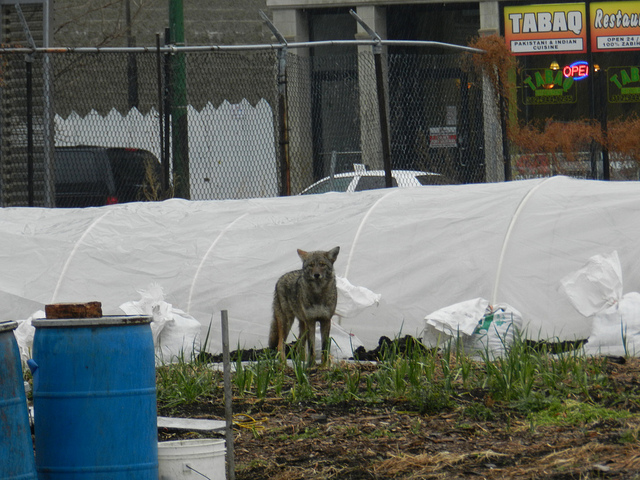Chicago Coyote Population Monogamous, Good Neighbors
By Chuck Sudo in News on Oct 4, 2012 8:50PM
Coyote sightings in Chicago have become so commonplace in recent years we rarely give them a second thought. (Unless a coyote wanders into a downtown Quizno’s. Or breaks into Lincoln Park Zoo. Or has to be rescued from an ice floe in Lake Michigan. Or wanders onto City Farm looking wet and miserable.)
That’s because the coyote population in Illinois and the Chicago area has grown and adapted to its urban environment. So-called “urban coyotes” have a 60 percent chance of surviving their first year and will live anywhere where there’s tall grass or bush. Estimates place the coyote population in the greater Chicago area at between 1,000 and 2,000.
Yet we have to chuckle when Chicago’s coyote population grabs national headlines, as it did with ABC News Wednesday. They spoke with Ohio State University urban ecologist Stan Gehrt, who’s been tracking coyotes in Chicago since 2000. Gehrt adds a new wrinkle to his research—coyotes are monogamous. Gehrt and colleagues Cecilia Hennessy and Jean Dubach 236 coyotes over a six-year period and, using blood samples to create DNA profiles, discovered that new pups were consistently created by the same two parents.
They’re also courteous neighbors. Adam Wertzler at the National Resources Defense Council makes a case for Chicagoans to embrace the growing coyote population. Wertzler, responding to an article in the Chicago Tribune that looks at the growth of their population, recent cougar sightings in the suburbs and the appearances of other species such as gray wolves and black bears in Illinois, says the encroaching wildlife could be a good thing and we shouldn’t be worrying too much.
Have you noticed a little less munching on your garden by rabbits and squirrels this year? If you have, it could be that a family of coyotes has taken up residence near your home. Coyotes, foxes, and other predators play an important role in nature -- not least of which is keeping smaller, often pesky, animal populations in check. …Nor does the story tell the reader -- despite quoting the expert whose studies show this -- that coyotes almost never kill people’s pets. In 2007, 1,400 scat samples taken from coyotes in Chicago showed the presence of...wait for it…one cat. And that could have been a stray. Buried at the end is the fact that coyote populations in Chicago are actually declining.
That expert would be Gehrt.
